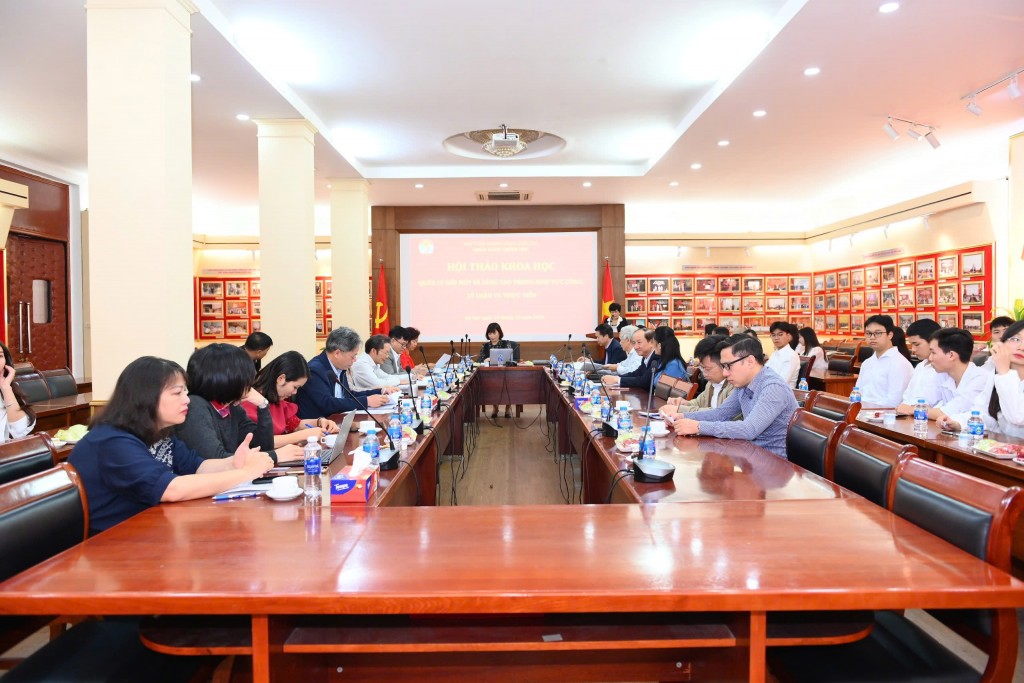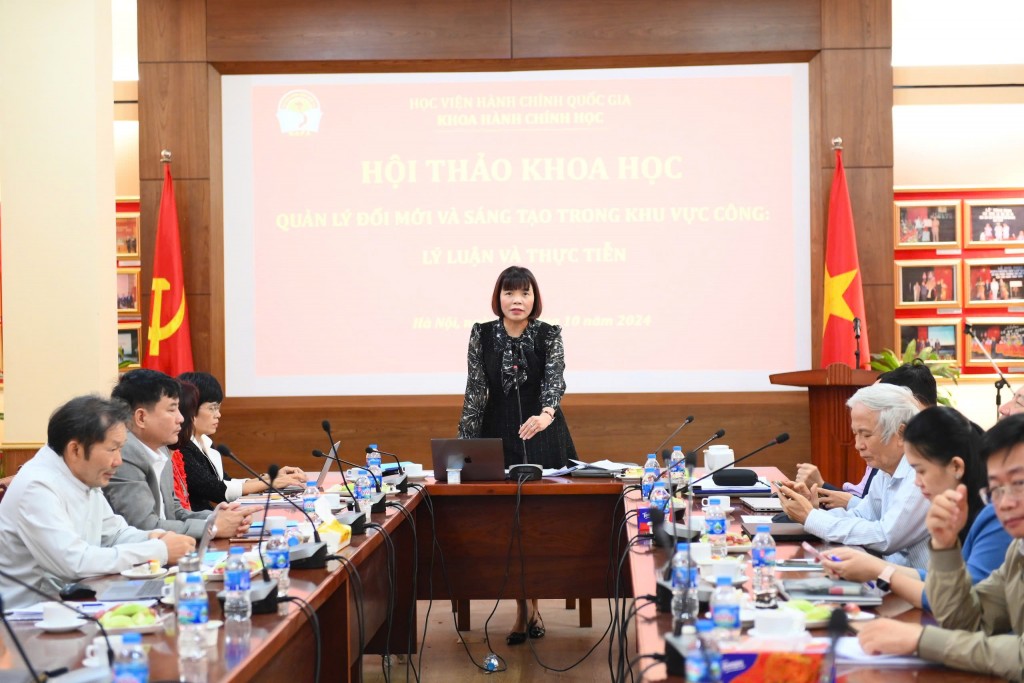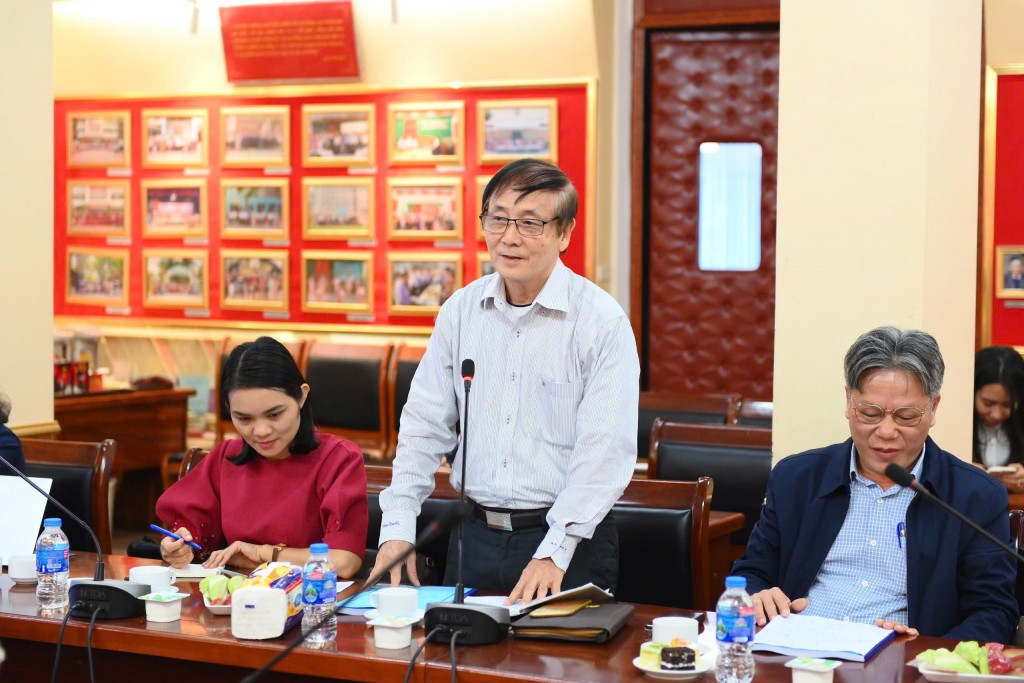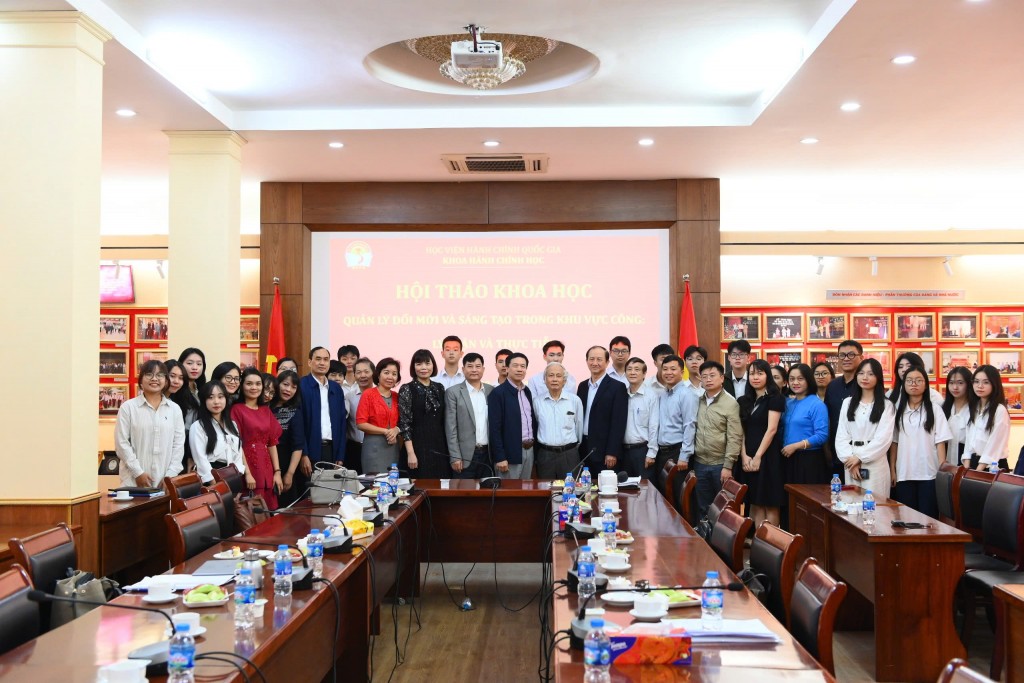On October 29, 2024, the National Academy of Public Administration (NAPA) organized a workshop titled Management of Innovation and Creativity in the Public Sector – Theory and Practice in Ha Noi. The workshop was chaired by Assoc. Prof. Dr. Nguyen Thi Hong Hai, Dean of the Faculty of Administrative Studies.
Participants included key guest speakers such as Dr. Nguyen Van Truc, Director of the Training and Support Center for Technology Commercialization at the National Agency for Technology Entrepreneurship and Commercialization Development (NATEC), Ministry of Science and Technology; Mr. Do Tien Thinh, Deputy Director of the Viet Nam National Innovation Center, Ministry of Planning and Investment; Ms. Nguyen Thi Ngoc Dung from the Viet Nam National Innovation Center, Ministry of Planning and Investment; Dr. Tran Nghi, Editor-in-Chief of the Journal of State Organization, Ministry of Home Affairs; Dr. Nguyen Ngoc Van, former Director of the Institute for State Organizational Sciences, Ministry of Home Affairs; and Dr. Ha Quang Ngoc, former Vice Rector of the Hanoi University of Home Affairs.
From NAPA, participants included Vice Presidents Assoc. Prof. Dr. Luong Thanh Cuong (attending online), Dr. Nguyen Dang Que, and Dr. Lai Duc Vuong, as well as Assoc. Prof. Dr. Vo Kim Son, former Dean of the Faculty of Administrative Sciences, and Assoc. Prof. Dr. Bui Huy Khien, former Deputy Dean of the Faculty of Administrative Sciences. Leaders from various departments, units, and faculties within NAPA, along with numerous faculty members, lecturers, and students from the Faculty of Administrative Sciences, also attended.
The workshop was held both in person and online, connecting participants from three NAPA campuses located in Ho Chi Minh City, Dak Lak, and Quang Nam.
Innovation in the public sector is an urgent requirement for Viet Nam in the context of international integration and the Fourth Industrial Revolution. Public sector innovation aims to propel Viet Nam towards strength and prosperity, creating momentum and a foundation for national development. Therefore, innovation requires synchronized efforts in both thinking and action with focused, practical solutions.
The 13th National Congress of the Communist Party of Viet Nam emphasized the role of innovation as foundational and motivational across three strategic breakthrough tasks: completing an inclusive development framework, fostering innovation; developing human resources, especially high-quality talent; and building a comprehensive and modern infrastructure system, both economically and socially. The Politburo’s Resolution No. 52-NQ/TW dated September 27, 2019, outlines policies for proactive participation in the Fourth Industrial Revolution, emphasizing the policy of national innovation capacity building. Decision No. 569/QD-TTg dated May 11, 2022, which enacted the Strategy for Science, Technology, and Innovation Development to 2030, explicitly states: “Developing a national innovation system and sectoral and regional innovation systems, with enterprises at the center, research institutes, and universities as strong research entities, and the State directing, coordinating, and creating favorable institutional and policy environments to ensure the effective functioning of the entire system.”
Dr. Lai Duc Vuong commended the Faculty of Administrative Sciences for their thorough preparation and organization of the workshop. The workshop is designed to provide a forum for scientists and practitioners to share, discuss, and analyze theoretical and practical issues related to innovation and management in the public sector. This serves to enhance teaching, academic research, and the training and professional development of lecturers in the Faculty of Administrative Sciences specifically, and for NAPA more broadly.
In her opening remarks at the workshop, Assoc. Prof. Dr. Nguyen Thi Hong Hai, Dean of the Faculty of Administrative Sciences, expressed her gratitude to distinguished guests, scientists, and faculty members from both inside and outside NAPA for taking the time to attend the event. Assoc. Prof. Dr. Nguyen Thi Hong Hai highlighted that innovation has already been extensively implemented in Viet Nam’s public sector, yielding initial positive outcomes. According to the 2024 Global Innovation Index (GII) report by the World Intellectual Property Organization (WIPO), Viet Nam’s GII ranking rose two spots from 46th in 2023 to 44th among 133 economies. This year, Viet Nam leads in three indicators: high-tech imports, high-tech exports, and creative goods exports. Notably, for the first time, Viet Nam achieved the number one global position in creative goods exports.
However, to drive impactful, context-appropriate innovation that contributes meaningfully to Viet Nam’s development goals, deeper research is essential to establish theoretical and practical foundations for further innovation in the public sector. To ensure the workshop achieves optimal outcomes, Assoc. Prof. Dr. Nguyen Thi Hong Hai encouraged participants to focus on the following key topics:
(1) General issues on innovation and management of innovation: Differences between managing innovation in the public and private sectors.
(2) Theoretical aspects of managing innovation in the public sector: Subjects, scope, and content of innovation management; the context and requirements of public sector innovation management; models and mechanisms; roles of key players in innovation management; factors influencing innovation management in the public sector.
(3) Practical aspects of innovation management in Viet Nam’s public sector: Perspectives of the Party and State of Viet Nam on public sector innovation; achievements, limitations, and reasons for limitations; opportunities and challenges; issues and solutions for managing innovation in the public sector in Viet Nam.
(4) International experiences in public sector innovation management: Valuable insights from the experiences of other countries that can serve as references for Viet Nam.
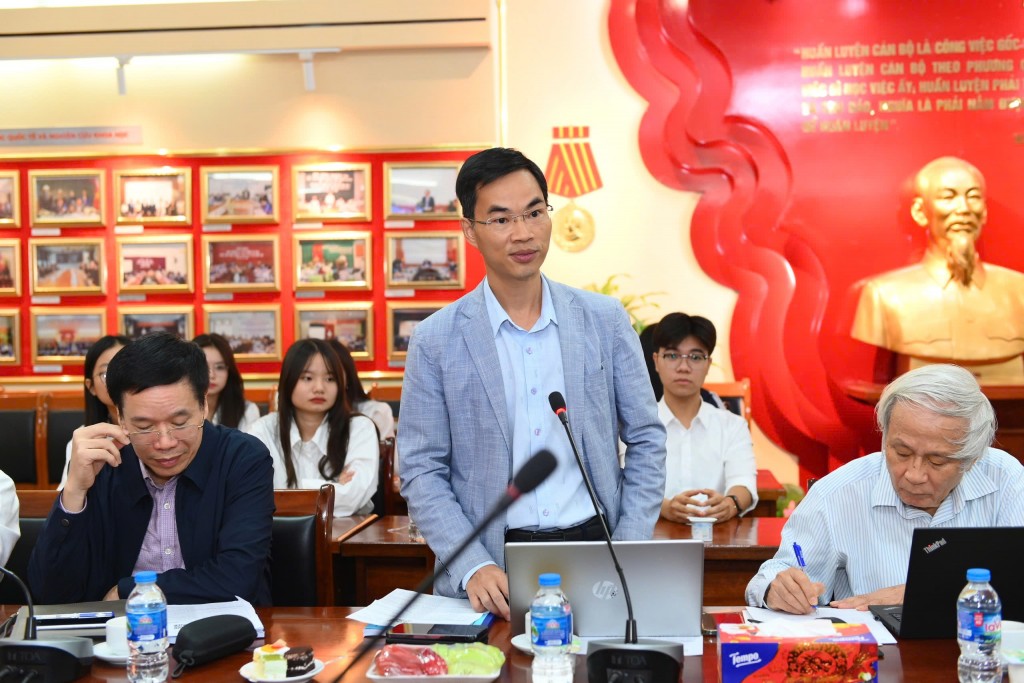
Mr. Do Tien Thinh, Deputy Director of the Viet Nam National Innovation Center, Ministry of Planning and Investment, at the workshop.
Presenting at the conference on the topic of “Innovation Policies in Viet Nam’s Public Sector,” Mr. Do Tien Thinh, Deputy Director of the Viet Nam National Innovation Center under the Ministry of Planning and Investment, noted that recent years have seen increasing interest in innovation from both the state and society, across both private and public sectors. Innovation in the public sector generates new social value and improves efficiency, adaptability, and competitiveness, contributing to economic growth and societal welfare. He provided an overview of public sector innovation in Viet Nam, the current state of innovation policies, and proposed several policy recommendations to further encourage innovation. To foster an environment conducive to public sector innovation, he suggested the government focus on researching, issuing, and refining policies that protect, incentivize, and support key innovation stakeholders, including (1) Financial policies for innovation; (2) Human resource development policies; (3) Infrastructure investment policies for innovation.
In addition to these policy areas, public agencies and organizations need to adopt practical solutions such as: improving the legal framework to ensure transparency, clarity, and security for public sector employees performing their duties; simplifying administrative procedures to make public services more accessible to citizens and businesses, thereby creating more space for public sector innovation; enhancing decentralization to empower local governments to proactively address challenges; training public officials in innovation skills, especially in managing and leveraging technology; encouraging collaboration between public agencies and private enterprises for innovation initiatives; developing evaluation metrics to assess the effectiveness of public sector innovation activities; facilitating feedback from citizens and businesses on service quality to drive continuous improvement; and building a public sector culture that values creativity, embraces risk, and respects new ideas.
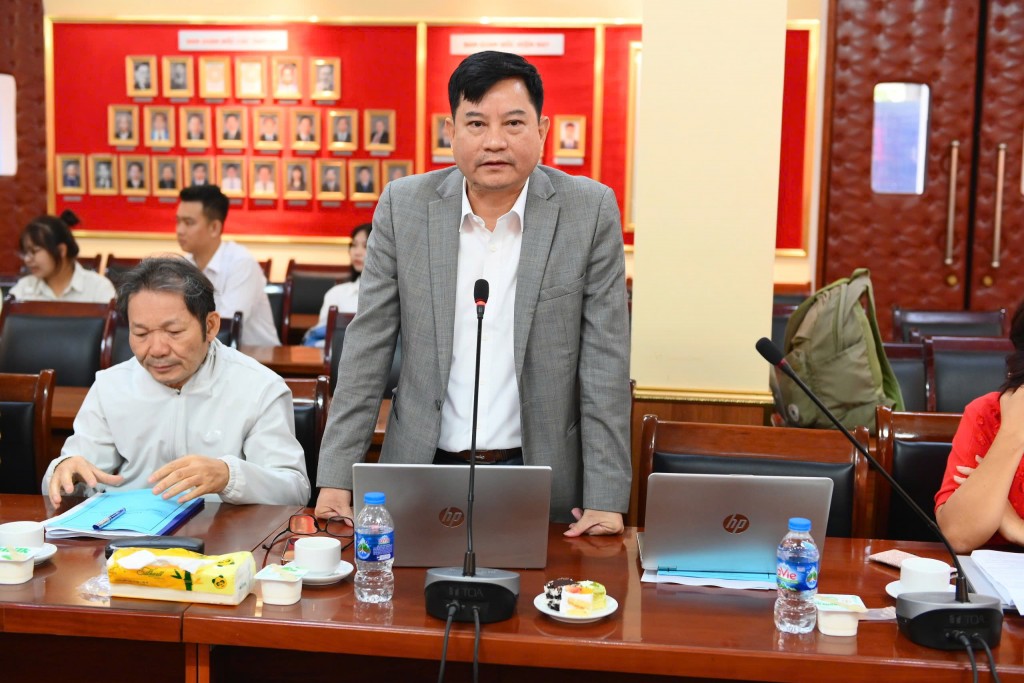
Dr. Nguyen Van Truc, Director of the Training and Support Center for Technology Commercialization at the National Agency for Technology Entrepreneurship and Commercialization Development (NATEC), Ministry of Science and Technology, at the worskhop.
Mr. Nguyen Van Truc discussed key theoretical and practical aspects of innovation, including models and mechanisms for managing innovation in the public sector, the factors that impact public sector innovation, the differences between innovation in the public and private sectors, and the current context and requirements for public sector innovation. According to him, public sector innovation should align with the Party’s guidelines and State policies on innovation management in the public sector. Implementing policies that are practical and specific to the Party and State’s innovation goals can expedite this process, ultimately benefiting public services, business operations, and citizens’ lives.
He emphasized the need for a shift in mindset within public sector innovation—from administrative management to result-based management, and from conservative thinking to an innovative approach. Additionally, capacity building is essential, particularly through training programs to equip public officials with knowledge and skills in innovation and IT. Developing information systems and applying technology, artificial intelligence, and big data into management practices can enhance work efficiency. Simplifying administrative procedures is also crucial, streamlining processes to create a more favorable environment for citizens and businesses with transparent mechanisms. He also underscored the importance of fostering an innovative culture within public sector organizations, encouraging creative ideas, valuing diverse opinions, and creating a workplace environment that enables public officials to maximize their potential. This environment, in turn, allows for evaluating the effectiveness of innovation through practical public service delivery. Lastly, he highlighted the importance of strengthening public-private partnerships between government bodies, businesses, and social organizations to promote robust innovation collaboratively.
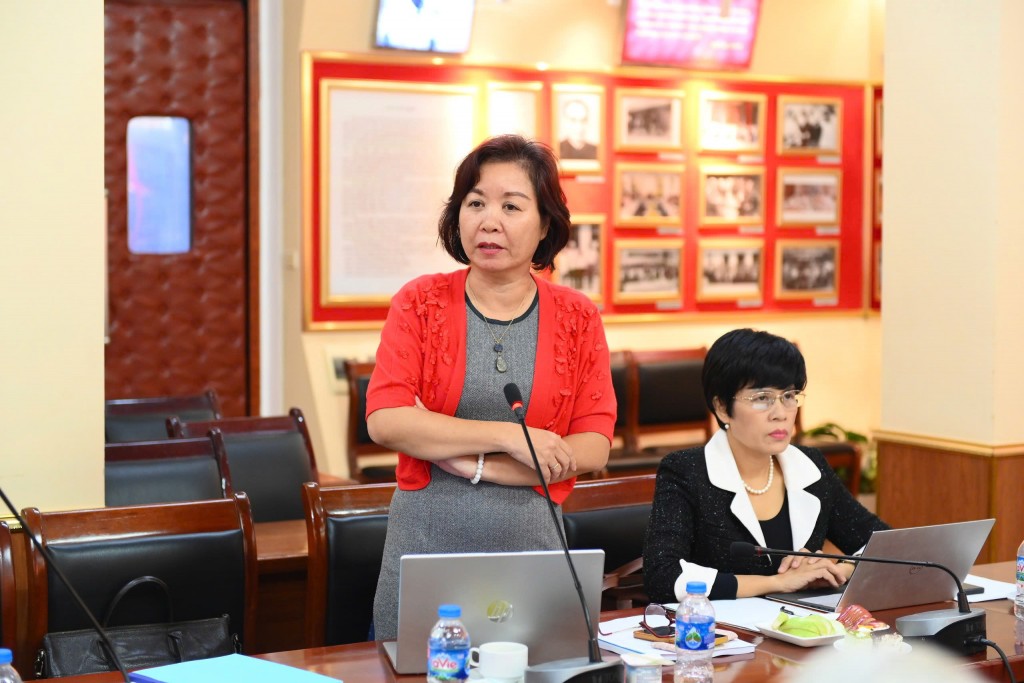
Ms. Nguyen Thi Ngoc Dung, Viet Nam National Innovation Center, Ministry of Planning and Investment, at the workshop.
Ms. Nguyen Thi Ngoc Dung from the Viet Nam National Innovation Center under the Ministry of Planning and Investment spoke about “The Innovation Ecosystem – Management Experiences from the United States.” She highlighted the role of timely policies in Viet Nam’s continuous advancement in innovation rankings, citing initiatives such as the Commercialization of Technological Products Project following Silicon Valley models (2012); Decree No. 87/2014/ND-CP on attracting overseas Vietnamese and foreign experts to engage in science and technology activities in Viet Nam; and Project 844 to support the national startup ecosystem through 2025. She identified several constraints to Viet Nam’s innovation ecosystem, including underdeveloped intermediary organizations, financial institutions that have yet to keep pace with innovation, the nascent stage of State-led innovation policy frameworks, and traditional enterprises with limited technology and financial resources. To address these challenges, she offered several recommendations: (1) designing transformative policies to facilitate a shift from innovation systems to innovation ecosystems; (2) providing training and fostering a workforce skilled in innovation, along with establishing investment funds or even venture capital funds; (3) implementing a sandbox policy and attracting global startups to Viet Nam.
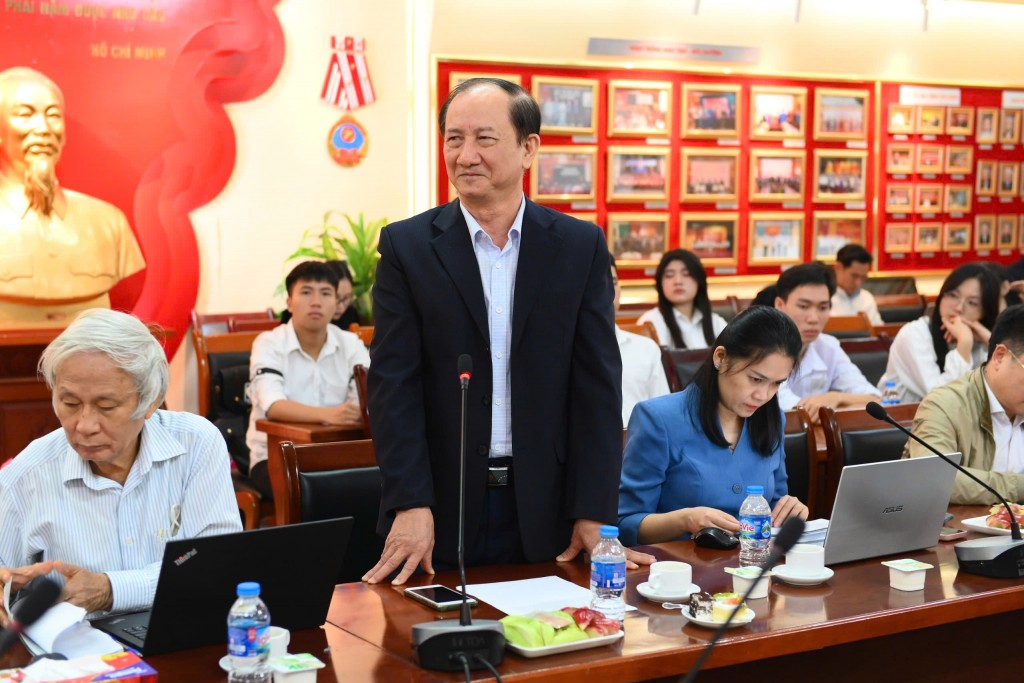
Assoc. Prof. Dr. Bui Huy Khien, former Vice Dean of the Faculty of Administrative Sciences, at the workshop.
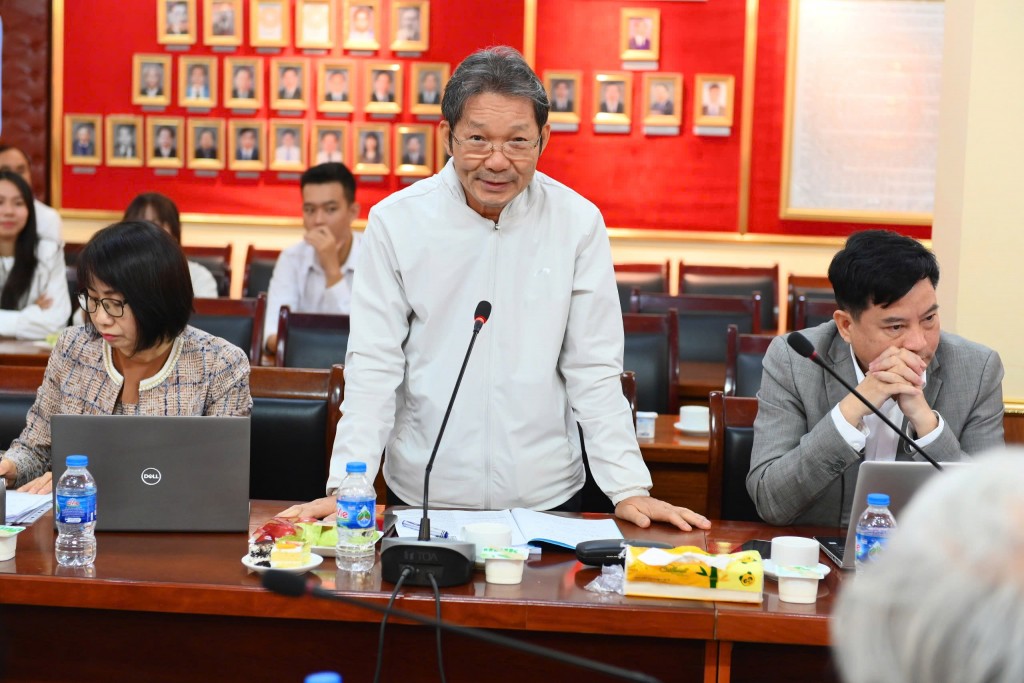
Dr. Nguyen Ngoc Van, former Director of the Institute for State Organizational Sciences, Ministry of Home Affairs, at the workshop.
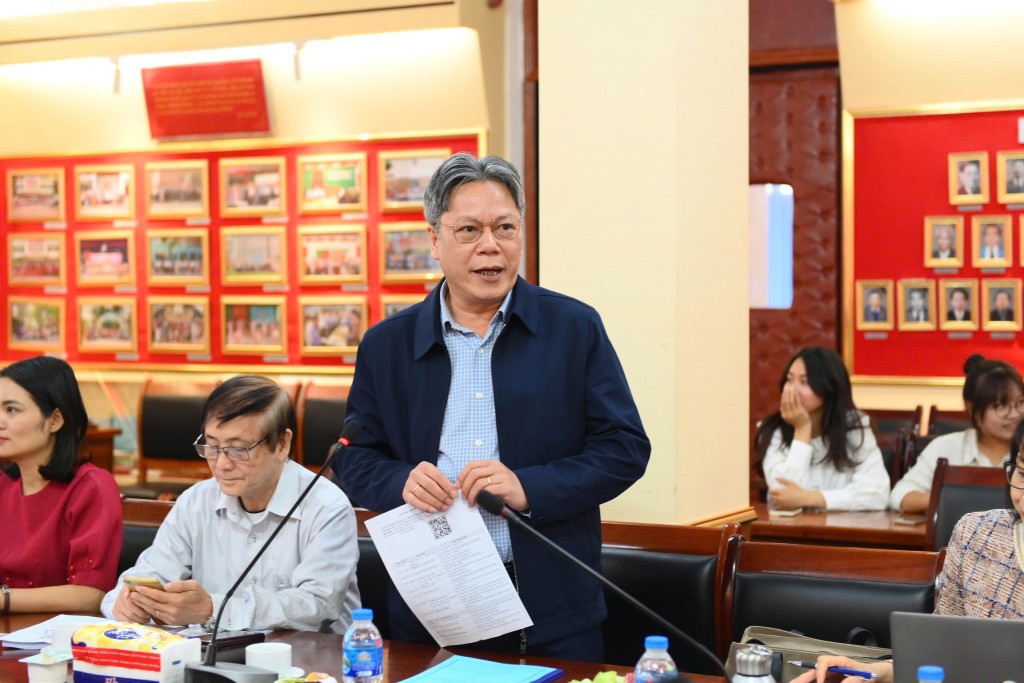
Dr. Tran Nghi, Editor-in-Chief of the Journal of State Organization, Ministry of Home Affairs, at the workshop.
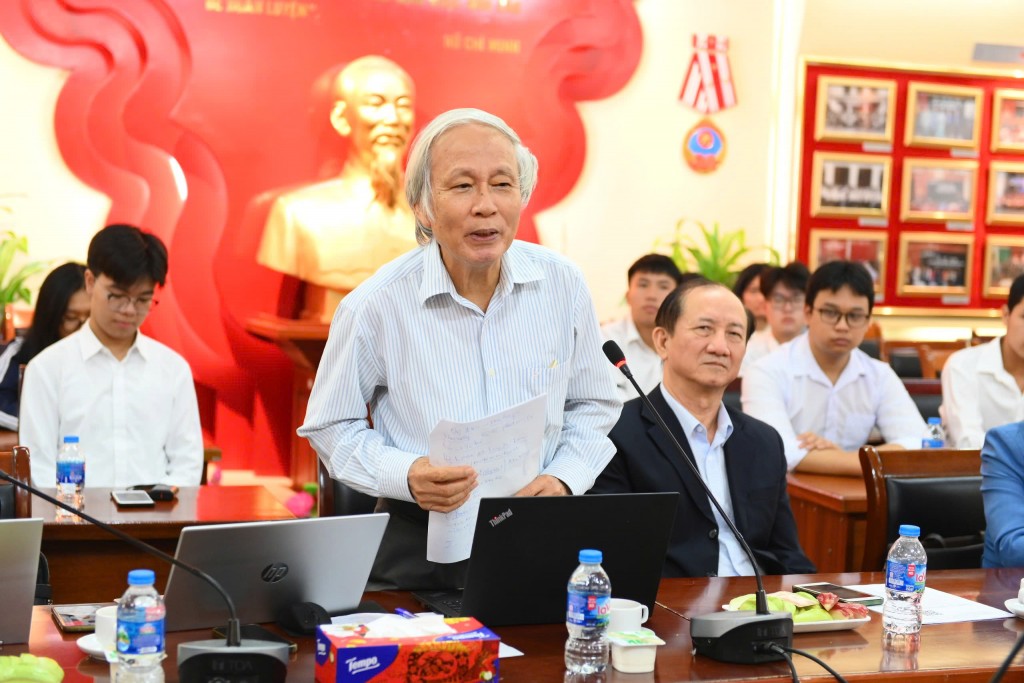
Assoc. Prof. Dr. Vo Kim Son, former Dean of the Faculty of Administrative Sciences, at the workshop.
The workshop also featured insights shared by delegates, experts, and scientists on managing innovation in the public sector. Discussions focused on key points such as: (1) the necessity for innovation across all sectors; (2) recognizing that innovation is not simply about applying science and technology but also involves a broader perspective—innovation as a shift in mindset and new approaches to better meet the service delivery needs of citizens and businesses; (3) avoiding a strict distinction between the private and public sectors when it comes to innovation; (4) placing innovation within a framework of essential elements: innovation capacity, an enabling environment, and supportive institutions; and (5) embracing innovation by daring to think, act, and speak openly.
Concluding the workshop, Assoc. Prof. Dr. Nguyen Thi Hong Hai expressed gratitude for the valuable contributions of experts and scientists from within and outside NAPA who shared presentations and papers. The workshop organizers will thoughtfully consider these insights and experiences to propose solutions and recommendations that will enhance innovation activities and further inspire the NAPA faculty, staff, and students—especially those in the Faculty of Administrative Sciences—to dare to think, act, and innovate in their training, teaching, and scientific research work. These efforts will also support the NAPA’s ongoing digital transformation initiatives in the coming period.


